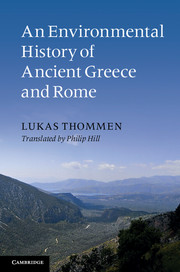Book contents
- Frontmatter
- Contents
- Figures
- Preface
- Introduction
- Part I Greece
- Part II Rome
- Chapter 11 The geographic space
- Chapter 12 People and nature
- Chapter 13 Agriculture
- Chapter 14 Forests and timber
- Chapter 15 Gardens
- Chapter 16 Animals
- Chapter 17 Food
- Chapter 18 Fire and water
- Chapter 19 Earthquakes and volcanoes
- Chapter 20 Mining
- Chapter 21 Urban problems and rural villa construction
- Chapter 22 The environment in Roman Britain
- Conclusion
- Chronology
- Further reading
- Sources
- Bibliography
- Index
Chapter 18 - Fire and water
Published online by Cambridge University Press: 05 June 2012
- Frontmatter
- Contents
- Figures
- Preface
- Introduction
- Part I Greece
- Part II Rome
- Chapter 11 The geographic space
- Chapter 12 People and nature
- Chapter 13 Agriculture
- Chapter 14 Forests and timber
- Chapter 15 Gardens
- Chapter 16 Animals
- Chapter 17 Food
- Chapter 18 Fire and water
- Chapter 19 Earthquakes and volcanoes
- Chapter 20 Mining
- Chapter 21 Urban problems and rural villa construction
- Chapter 22 The environment in Roman Britain
- Conclusion
- Chronology
- Further reading
- Sources
- Bibliography
- Index
Summary
FIRES IN ROME
Fire had religious significance in Rome, and was used in ritualistic veneration. The Volcanalia festivities were held every August in honour of the god of fire, Volcanus. In Rome the qualities of Hestia, the Greek goddess of the hearth, were embodied in the Latin goddess Vesta, goddess of the state hearth. A round temple at the forum Romanum was consecrated to her, as the central place of the community. Here there was a hearth with the eternal fire, tended by the Vestal Virgins, who were in priestly service. The shrine was at the same time the state's storage house, and was under the protection of the Penates, whose religious image (palladium) was kept here. The six Vestal Virgins enjoyed great honours and privileges, since they embodied purity and thus enabled expiation. Since their virgin inviolability symbolised stored fertility, they were important for growth and fertility rites. Their supreme duty besides their virginity was the guardianship of the eternal fire, as an expression of community. If the fire was extinguished, they risked being flogged (Dion. Hal. 2.67).
For Rome there was also a rational, political aspect of fire, since it could be used as an instrument of power. As in the case of water, the sources primarily refer to the capital itself. In the course of the growth of the city, the danger of fire was addressed organisationally. This at the same time lent political authority to those involved in such activities, since fires had been frequent during the Roman republic. Numerous major conflagrations are reported, particularly toward the end of the republic: in 50 bc an enormous blaze destroyed numerous districts (fourteen vici), and the next year there was an earthquake accompanied by fires which destroyed many residential areas. It was the time that the old republican system was breaking apart; senatorial rule had proven incapable of addressing the problems facing Rome and its empire, and the ruling elite was engaged in constant internal strife. In this situation Caesar seized power with his army and began to reorganise the state, but was then murdered in 44 bc.
- Type
- Chapter
- Information
- An Environmental History of Ancient Greece and Rome , pp. 103 - 113Publisher: Cambridge University PressPrint publication year: 2012



